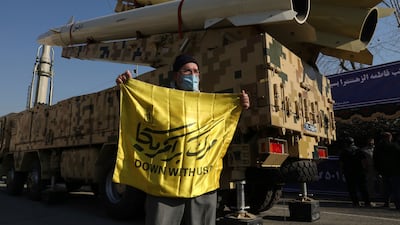A major foreign policy push in US President Joe Biden's first year was the attempt to revive the 2015 Iran nuclear deal that his predecessor Donald Trump ripped up.
But Mr Biden has little to show for his efforts as Tehran's proxies continue attacks against US and international interests in Iraq, Syria and elsewhere.
Proponents and critics of the original nuclear deal, known as the Joint Comprehensive Plan of Action (JCPOA), saw Mr Biden fail to secure Iranian compliance early in 2021 under the Hassan Rouhani government. Hurdles only grew taller following the ascendance of hard-line cleric Ebrahim Raisi to the presidency.
The Biden administration, for the most part, has maintained prior sanctions on Iran and it twice retaliated against Iranian proxy attacks on US bases in the Middle East.
But it has not engaged directly with leaders in Tehran, even as it seeks a return to the JCPOA.
Esfandyar Batmanghelidj, a visiting fellow and Iran scholar with the Middle East and North Africa programme at the European Council on Foreign Relations, said the Biden strategy has been undermined by a faulty political calculus.
“Mr Biden's approach to Iran has been disappointing. He overestimated his own willingness to spend political capital on Iran, wavering on his campaign promise to restore the JCPOA when he refused to take any unilateral steps [such as releasing pressure on Iran] to kick start the talks,” Mr Batmanghelidj told The National.
Talks have dragged on into their eighth round in Vienna, while Iran has boosted its stockpile of 60 per cent-enriched uranium.
The US has said that the window is fast closing on preventing Iran from reaching “breakout capability” — the point at which it can produce nuclear weapons.
“Iran is getting closer and closer to the point where they could produce on very, very short order enough fissile material for a nuclear weapon,” US Secretary of State Antony Blinken told NPR this month.
As last year's talks started, Mr Biden “underestimated Iran's willingness to restore the JCPOA [under Rouhani], creating friction in the talks by suggesting that Iran was simply buying time for its nuclear escalations”, Mr Batmanghelidj said.
Lifting sanctions is a key demand for Iran. But so, too, is a guarantee that a future US president will not renege on Mr Biden’s commitments.
“Iran is pushing the US to ensure that a future president can't just tear up the deal as Mr Trump did in 2018,” Mr Batmanghelidj noted.
Such a treaty would require support from two thirds of the US Senate — unlikely given Republican opposition.
Still, Mr Batmanghelidj sees an eventual restoration of the JCPOA as “more likely than widely believed”, noting that for both the US and Iran, the value of the deal no longer stems primarily from an improvement in bilateral relations.
“The US needs the nuclear deal to extract itself from the Middle East and restore some global credibility and Iran needs the nuclear deal to help consolidate a more functional political and economic relationship with its Arab neighbours, with Europe and with China,” he said.
But others, such as Behnam Ben Taleblu, a research fellow at the Foundation for Defence
of Democracies, said Mr Biden has squandered US pressure and is not committed to fully resolving the nuclear issue.
“At the heart of Mr Biden's Iran strategy appears to be a desire to cap rather than solve the Iranian nuclear dispute,” Mr Taleblu said.
“Given Iran's nuclear and regional advances, many of which were kicked into high gear after the election of President Biden in November 2020, the JCPOA of 2015 makes no strategic sense.
“Working to resurrect this fatally flawed deal is in essence a way to buy time to pivot out of the Middle East.”
The failure to secure a return to the JCPOA highlight's Washington's shrinking leverage.
“In 2021, the Biden administration set the predicate to undervalue its inherited economic leverage against Iran in several lasting ways. These included an overzealous desire for a nuclear deal as well as a lack of willingness to enforce sanctions tied to Iran's bad behaviour such as illicit oil smuggling and arms proliferation,” he said.
On regional security, the expert saw a similar pattern, saying that the Biden team “undervalued the impact that its discourse on regional security and the Afghanistan withdrawal could have on Iranian strategic thinking”.
“Coupled with an evolution in Iran's drone threats to include missiles, rockets, and drones, Iran feels more confident in its regional strategy of working to drive America out of the region,” Mr Taleblu argued.
The Biden administration should have thrown its weight behind the International Atomic Energy Agency-Iran track to strengthen inspections and monitoring of the nuclear programme, rather than attempt to resurrect the JCPOA, he said.
“Expressing an eagerness for talks and not even being able to sit in the same room as the Iranians was and remains entirely self-defeating.”
A year into the talks and with Iran continuing to violate the deal while engaging in proxy attacks against US targets in Iraq and Syria, the Biden administration is now looking at “snapback” sanctions if negotiations collapse.
Henry Rome of the Eurasia group put chances of a deal in Vienna before June at 25 per cent.
“The most likely scenario this year is an escalation short of war, in which negotiations break down and the grey-zone conflict between Israel and Iran intensifies alongside more US sanctions pressure,” Mr Rome wrote.
But in a press conference on Wednesday, Mr Biden appeared reluctant to give up on negotiations.
"It's not time to give up," he said. "There is some progress being made. P5 plus one [the UN Security Council's five permanent members plus Germany] is on the same page. But it remains to be seen."


